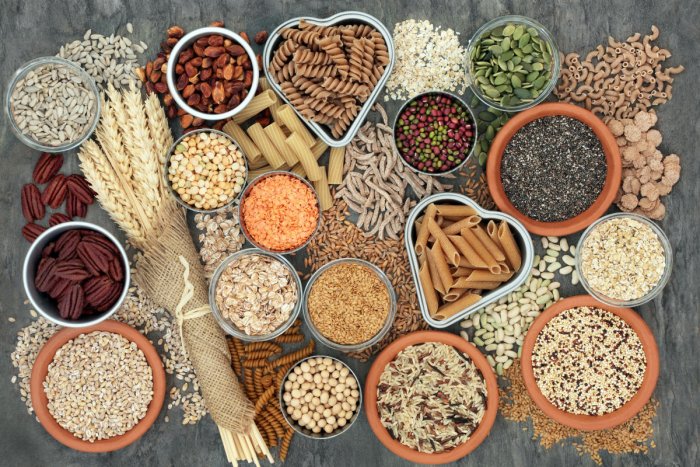All grains, from the familiar (Wheat including cracked wheat and wheatberries, Oats, Rye, Corn, Rice, both brown rice and coloured rice such as Wild rice) to the less well-known (Amaranth, Barley, Buckwheat, Millet, Spelt, Emmer (farro), Einkorn, Kamut, durum and forms such as Bulgur, Quinoa, Sorghum (also called milo), Teff and Triticale). The bran and germ of these grains components are rich in fibre, vitamins, minerals, antioxidants, and healthy fats. These are the parts removed in the refining process to produce white wheat flour or other products made from refined grains, where the refined product is mainly starch and has lost most of its nutrients.
Whole grain foods provide a good source of minerals in the diet, including calcium, potassium, magnesium, iron, zinc and phosphorus. The bioavailability of minerals may, however, be limited due to the presence of phytate (inositol hexaphosphate). Whole wheat and other whole grains can also be rich sources of selenium, although the actual selenium content of the grain will vary according to the selenium content of the soil and this can dramatically affect the nutritional selenium intake.
Whole grains have for long been known to be an important source of vitamins, such as thiamine, vitamin E and folates. Especially Vitamin E, an antioxidant, seems to be present in high amounts in just about all whole wheat and whole grain products. Vitamin E is thought to be a strong antioxidant which has the power to prevent cancer-causing chemicals, e.g. alloxan, leftover during processing white bread, from doing harm. If you have to use white flour in baking as it does produce lighter breads, the addition of whole grain to white flour is beneficial as it cancels the effect of alloxan.
Whole grain foods may also have anti carcinogenic properties because of Vitamin E’s ability to destroy nitrite. Nitrates and nitrites, used in combination with salt, serve as important antimicrobial agents in processed meat to inhibit the growth of bacterial spores that cause botulism, a deadly food-borne illness. Nitrites are also used as preservatives and for flavouring and fixing colour in a number of red meat, poultry, and fish products. Nitrites are associated with the production of some type of cancers especially in children. Direct chemical interaction between antioxidants and nitrites/nitrates has long been recognized and it is now known that antioxidant from natural foods can prevent numerous types of cancers. Vitamins, such as Vitamin E is strongly depended on the refining process and that is why the food industry is obliged to add vitamin E to bakery products since bakeries prefer rather light flours for bread making. Moreover, during the baking process, there is loss of Vitamin E. Whole grain foods rich in Vitamin E may have positive effects on human health and well-being due to the fact that these bioactive compounds can protect polyunsaturated fatty acids against oxidative damage in cell membranes. For these reasons, consumption instead of supplementation of products rich in Vitamin E should be recommended. More about alloxan, nitrites and other preservatives/additives in foods and how to prevent the formation of carcinogenic products from these preservatives or additives can be found in “Is Your Food Killing You?”














